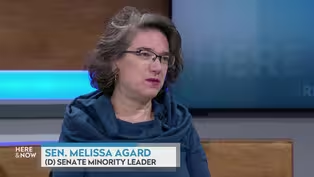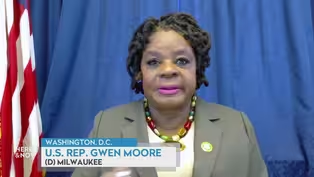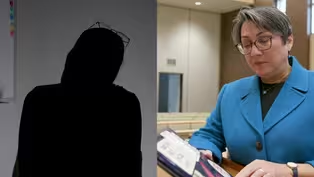Here and Now
Racism, Cycles of Trauma and the Importance of Mental Health
Clip: Season 2200 Episode 2220 | 6m 8sVideo has Closed Captions
Generational trauma harms the mental health of Black children and adults in Wisconsin.
Generational trauma continues to harm the mental health of Black children and adults in Wisconsin, but advocates and religious leaders seek to help communities with empowerment and expressions of joy.
Problems playing video? | Closed Captioning Feedback
Problems playing video? | Closed Captioning Feedback
Here and Now is a local public television program presented by PBS Wisconsin
Here and Now
Racism, Cycles of Trauma and the Importance of Mental Health
Clip: Season 2200 Episode 2220 | 6m 8sVideo has Closed Captions
Generational trauma continues to harm the mental health of Black children and adults in Wisconsin, but advocates and religious leaders seek to help communities with empowerment and expressions of joy.
Problems playing video? | Closed Captioning Feedback
How to Watch Here and Now
Here and Now is available to stream on pbs.org and the free PBS App, available on iPhone, Apple TV, Android TV, Android smartphones, Amazon Fire TV, Amazon Fire Tablet, Roku, Samsung Smart TV, and Vizio.
Providing Support for PBS.org
Learn Moreabout PBS online sponsorship[solemn music] - If I'm talking about it and I'm not embarrassed about it, then you don't have to be embarrassed either.
The mental health of so many people, you know, myself included, are just being, I mean, it feels like you're just being constantly attacked.
- Nathan: Reverend Everett Mitchell is a pastor at Christ the Solid Rock Baptist Church in Madison, and also a Dane County judge.
- I don't know what it is, but people are feeling darker now.
- Mental health is so, so extremely important, especially in the aftermath of COVID.
- Nathan: Dr. Jasmine Zapata is the chief medical officer for community health at the Wisconsin Department of Health Services.
- Younger people, and in particular our Black youth, where we see increases in overdoses, mental health concerns, adverse childhood experiences.
- I grew up, there was a lot of trauma, but nobody talked about it.
There was a lot of pain; nobody expressed it.
We saw cycles of people, you know, alcoholism and drug abuse, just kind of going through the same cycles.
- Nathan: Repeating cycles in families that go way back.
For Lilada Gee, many of the mental health issues facing the Black community today can be attributed to the generational trauma they hold.
- I think there is not a Black American that is not touched by generational trauma.
- Nathan: Gee is the founder of Defending Black Girlhood, a nonprofit that works with Black girls and women to unpack and heal their trauma.
As part of that work, she creates art depicting resiliency.
She is also a lecturer at the Madison-based Nehemiah's Justified Anger: Black History for a New Day course.
The nine-week course teaches the community about race, history, and justice.
- In the way I would define it is something has happened to an ancestor that was so devastating that the impact reverberates to today.
- Nathan: Even if you aren't aware of the trauma you carry, Reggie Jackson says it can affect your life.
- It teaches you to see yourself in a very specific way.
It teaches you that somehow, you can't think of yourself in a positive way.
- Nathan: Jackson is a community leader in Milwaukee.
- You are going to be told by society, generation after generation, even after slavery ends, that you are an inferior species, that you are not deserving of being treated as a first-class citizen in America.
- If you don't have the experience to be able to heal, then that trauma remains there.
- It passes down in terms of the way that you interact with your family members, your children, your grandchildren, your great-grandchildren.
All of those things are impacted by the people that came before you.
- Nathan: Generations of people being treated as second-class citizens, often expressed by what are known as microaggressions.
- Microaggressions from my definition, are these small, insidious experiences that happen on a regular basis.
- Nathan: Some are small and insidious; others are overt, and they can happen in every facet of life, like trying to schedule appointments.
- The lady I'm talking to, she puts her hand over the phone and says to somebody in the background, "I don't mean to be racist, but I think I'm talking to an angry Black woman here."
- Everett: We thank you, God, for all these blessings... - Nathan: At Christ the Solid Rock, Mitchell says the trauma his parishioners carry is always on his mind.
- I prioritize not only education about the faith, but also your mental health, mental well-being as a spiritual priority.
- Nathan: While church attendance is declining, nearly 70% of Black Americans still go to church at least once a month.
- The Black church is essential because it speaks to the issues that people experience.
- Nathan: The Black church has been part of American life before America was even founded.
The first Black church was founded in 1773 during slavery.
- In many ways, the Black church is a response to the, you know, the brutality of slavery in our American history.
- Nathan: Mitchell says the Black church differs from most white churches because they often talk about religious practicality.
- What you experience on the outside of the world should be brought in here so we can better understand how we deal with it, how we talk about it.
- Nathan: To help his congregation through the trauma they may have, Mitchell gives a five-week sermon every year to help define and heal from trauma and resulting problems with mental health.
- You don't have to pray it away.
It is something we identify and we live with, and it's the living with it that gives us the courage to be able to transform it into something that can be useful for us and for our families that we serve.
- Nathan: He says the sermons have had a tremendous impact on his congregation.
- But it's something within us.
That in and of itself has given people permission to move in and out of the space of trauma without thinking that this is something that they need to get rid of or that one sermon or one prayer is gonna just release it.
- Nathan: For Lilada Gee, the most important healing work is with Black women.
- It's hard for the Black community to move forward if Black women are not healed, and if Black women are not healed, then they continue to pass that pain on to generation to generation.
- Nathan: But she says that healing is possible if you're willing to put in the work and lean into joy.
- Joy is something that you feel, you just get to feel when you lean in, and comes from gratitude, and it comes from hope and the belief that your life can be better.
- Our messages have to become brighter, and the only way that we can do that is to give people a demonstrated experience in our local community to offset all of the crazy stuff that they're hearing about.
- The trauma that we've experienced is not something we have to carry for a lifetime.
- Nathan: For Here & Now, I'm Nathan Denzin.
Here & Now opening for November 17, 2023
Video has Closed Captions
Clip: S2200 Ep2220 | 1m 5s | The introduction to the November 17, 2023 episode of Here & Now. (1m 5s)
Sen. Melissa Agard on the Milwaukee Brewers Stadium Deal
Video has Closed Captions
Clip: S2200 Ep2220 | 5m 35s | Melissa Agard on bipartisan perspective for funding improvements to American Family Field. (5m 35s)
US Rep. Gwen Moore on Violence Against Women and Firearms
Video has Closed Captions
Clip: S2200 Ep2220 | 7m 21s | Gwen Moore on her House resolution addressing guns, misogyny and domestic violence. (7m 21s)
War Torments Wisconsinites with Ties to Israel and Gaza
Video has Closed Captions
Clip: S2200 Ep2220 | 5m 39s | Wisconsinites with Israeli and Palestinian family ties search for hope in conflict. (5m 39s)
Providing Support for PBS.org
Learn Moreabout PBS online sponsorship
- News and Public Affairs

Top journalists deliver compelling original analysis of the hour's headlines.

- News and Public Affairs

FRONTLINE is investigative journalism that questions, explains and changes our world.












Support for PBS provided by:
Here and Now is a local public television program presented by PBS Wisconsin



